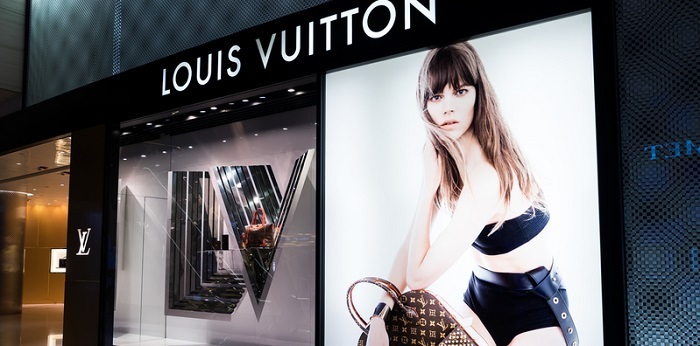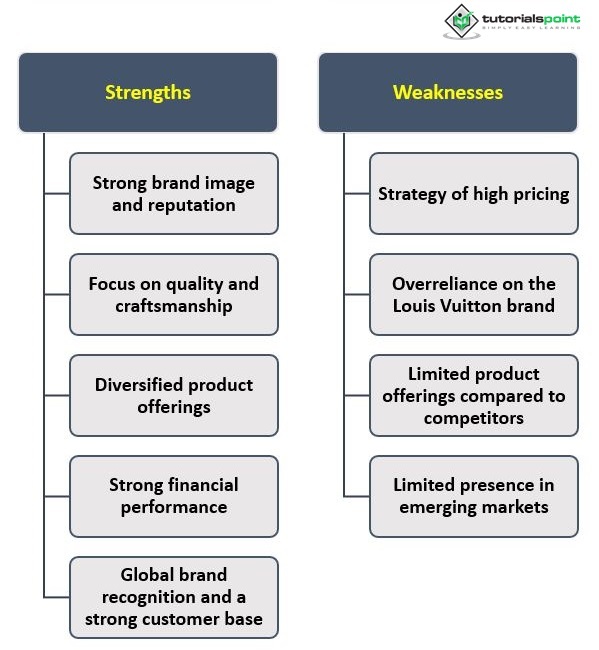

Louis Vuitton is a French luxury fashion house founded in 1854. The brand has experienced significant growth and is now a global leader in the luxury goods industry. Key factors contributing to its growth include expansion into new markets, diversification of product offerings, a strong brand image, a digital presence, and collaborations with celebrities and influencers.

Louis Vuitton is a luxury fashion house founded in 1854 in France. Over the years, the brand has experienced significant growth and has become a global leader in the luxury goods industry. Some key factors contributing to the brand's growth include
Expansion into new markets − Louis Vuitton has successfully expanded into new markets, particularly in Asia, where there is a growing demand for luxury goods.
Diversification of product offerings − Louis Vuitton has expanded its product offerings beyond just leather goods to include ready-to-wear clothing, shoes, jewelry, and other luxury products.
Strong brand image − Louis Vuitton has built a strong brand image and reputation, which has helped the company attract new customers and retain its existing ones.
Digital presence − Louis Vuitton has made significant investments in its digital presence, which has helped the brand reach a wider audience and drive sales.
Collaborations with celebrities and influencers − Louis Vuitton has successfully leveraged collaborations with celebrities and influencers to increase brand visibility and awareness.
Overall, Louis Vuitton's focus on expanding into new markets, diversifying its product offerings, building a strong brand image, investing in digital technologies, and leveraging collaborations with celebrities and influencers has been key to the brand's growth and success.
The business model of Louis Vuitton is based on selling luxury products, including leather goods, ready-to-wear clothing, shoes, jewelry, and other accessories. The brand has a strong focus on quality and craftsmanship, and its products are marketed as luxury items with premium prices. Louis Vuitton operates its own retail stores as well as e-commerce platforms and department store partnerships to sell its products directly to consumers. The brand also collaborates with other luxury brands and designers to expand its product offerings and reach new audiences. Louis Vuitton also invests in marketing and advertising to build its brand image and reputation and maintain its position as a leader in the luxury goods industry. The business model of Louis Vuitton is built on several key points
Luxury product offerings − Louis Vuitton offers a range of luxury products, including leather goods, ready-to-wear clothing, shoes, jewelry, and other accessories.
Quality and craftsmanship − The brand places a strong emphasis on quality and craftsmanship, and its products are marketed as luxury items with premium prices.
Direct-to-consumer sales − Louis Vuitton operates its own retail stores as well as e-commerce platforms and department store partnerships to sell its products directly to consumers.
Collaborations − The brand collaborates with other luxury brands and designers to expand its product offerings and reach new audiences.
Marketing and advertising − Louis Vuitton invests in marketing and advertising to build its brand image and reputation and maintain its position as a leader in the luxury goods industry.
Innovation − Louis Vuitton consistently strives to innovate and stay ahead of trends in the luxury goods industry, whether it be in product design, manufacturing processes, or distribution channels.
Louis Vuitton's marketing strategy is centered around building and maintaining a strong brand image and reputation as a luxury fashion house. Some key elements of the brand's marketing strategy include
High-end advertising campaigns − Louis Vuitton creates high-end advertising campaigns that feature famous models, celebrities, and influencers to promote its products and increase brand visibility.
Experiential marketing − Louis Vuitton uses experiential marketing techniques to engage customers and create a strong emotional connection with the brand. For example, the brand might host pop-up events, product launches, and other special experiences that allow customers to interact with the brand and its products
Influencer marketing − Louis Vuitton leverages collaborations with influencers to reach a wider audience and drive sales. These collaborations often involve the influencer promoting Louis Vuitton products on social media and other digital platforms.
Premium retail experiences − Louis Vuitton creates premium retail experiences in its own stores and in partnerships with department stores. This helps the brand maintain its luxury image and provide a high-end shopping experience for its customers.
Digital presence − Louis Vuitton has invested in building a strong digital presence, which includes a comprehensive e-commerce platform and active social media accounts. The brand uses these channels to reach a wider audience, promote products, and drive sales.
Overall, Louis Vuitton's marketing strategy is focused on building and maintaining a strong brand image and reputation as a luxury fashion house and engaging customers through high-end advertising campaigns, experiential marketing, influencer marketing, premium retail experiences, and a strong digital presence.
A SWOT (Strengths, Weaknesses, Opportunities, and Threats) analysis is a tool used to evaluate a company's internal and external factors that may affect its performance. The SWOT analysis of Louis Vuitton is as follows

These are
Expansion into new markets, particularly in Asia
Expansion into new product categories
Expansion of e-commerce operations
Collaboration with other luxury brand
It includes
Increased competition in the luxury goods industry
Economic and political instability in key markets
counterfeit and knock-off products
Changing consumer preferences and attitudes towards luxury goods
By understanding the strengths, weaknesses, opportunities, and threats facing Louis Vuitton, the company can make informed decisions about how to continue growing and maintaining its position as a leader in the luxury goods industry.
The secret to Louis Vuitton's success can be attributed to a number of factors, including
Focus on quality and craftsmanship − Louis Vuitton places a strong emphasis on quality and craftsmanship, and its products are marketed as luxury items with premium prices. This focus on quality has helped the brand build a strong reputation and maintain its position as a leader in the luxury goods industry.
Consistent innovation − Louis Vuitton consistently strives to innovate and stay ahead of trends in the luxury goods industry, whether it be in product design, manufacturing processes, or distribution channels. This helps the brand remain relevant and attract new customers.
Strong brand image − Louis Vuitton has built a strong brand image and reputation, which has helped the company attract new customers and retain its existing ones. The brand is associated with luxury, quality, and craftsmanship, and these positive associations have been key to its success.
Expansion into new markets − Louis Vuitton has successfully expanded into new markets, particularly in Asia, where there is a growing demand for luxury goods. This has helped the brand reach new audiences and drive growth.
Diversification of product offerings − Louis Vuitton has expanded its product offerings beyond just leather goods to include ready-to-wear clothing, shoes, jewelry, and other luxury products. This diversification has helped the brand reach a wider audience and increase its overall sales.
Marketing and advertising − Louis Vuitton invests heavily in marketing and advertising to build its brand image and reputation and maintain its position as a leader in the luxury goods industry.
Overall, Louis Vuitton's success can be attributed to its focus on quality and craftsmanship, consistent innovation, strong brand image, expansion into new markets, diversification of product offerings, and investment in marketing and advertising.
In conclusion, Louis Vuitton is a luxury fashion house with a strong brand image and reputation. Over the years, the company has built its success on the foundation of quality and craftsmanship, innovation, diversification of product offerings, and investment in marketing and advertising. With a focus on expanding into new markets and product categories, as well as leveraging its strong digital presence, Louis Vuitton is well positioned for continued growth in the future.
However, the company faces significant challenges, including increased competition, changing consumer preferences, and economic and political instability. By carefully navigating these challenges through smart business decisions and a commitment to its core values, Louis Vuitton is poised to maintain its position as a leader in the luxury goods industry for years to come.